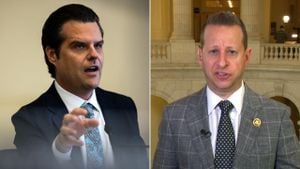When Donald Trump claimed victory as president-elect after the 2024 election, his supporters cheered, and many across the nation braced for the shift he promised. The repercussions of his presidency were instantly felt, particularly by those who had committed to ensuring his agenda would face challenges. For those who celebrated or mourned, it was just the beginning of what would undoubtedly be another tumultuous chapter in American politics.
Trump began his first week as president-elect with fervent declarations about his intentions and plans, not to mention his desire to reshape the core of American governance. His crew is already making waves, and one of the most notable plans is the aggressive immigration policy he announced, which aims at mass deportations. This sentiment reverberated through states like Washington, where immigrant communities — estimated at about 246,000 individuals without authorization — started to express stark concerns over their future. Within this backdrop, Trump’s agenda places immigrants squarely at risk, flipping the narrative on decades of policy precedence.
While his campaign made promises to bolster the economy, there are fears surrounding the potential fallout from his policies on the labor market. Economists say massive deportations will not only destabilize immigrant communities but could also lead to rising prices on goods and services. The intertwined nature of immigrant labor and American economic structures poses questions about fiscal stability under Trump’s radicalized plans.
According to the Migration Policy Institute, Washington state hosts around 13,500 individuals benefitting from the Deferred Action for Childhood Arrivals (DACA) program. Under Trump’s re-imagined deportation policies, the status of those within DACA remains precarious. His past efforts to dismantle playbooks from programs like DACA signal potential hardships for these communities.
The imminent possibility of court battles looms large over Washington state amid Trump’s anticipated changes to immigration practices. Activist groups like the Washington Immigrant Solidarity Network have predicted “inhumane, anti-immigrant rhetoric” and are gearing up to counter any policies infringing on rights and liberties.
The organizational response to Trump’s administration is taking shape, as groups like Democracy Forward prepare for aggressive legal battles against any potential legislation or executive actions they see as infringing on civil rights. Their readiness contrasts sharply with the unpreparedness seen during Trump's initial term, aiming to thwart through litigation what they believe are constitutional threats to Americans.
Meanwhile, environmentalists and advocates for climate policy are steeling themselves for confrontations with Trump’s administration. Washington’s reputation for strong environmental laws faces threats under the incoming administration, known for its disregard for federal regulations, particularly those related to climate change. The stakes are already high; water quality, air quality, and wildlife suffer when Washington's stringent policies clash with Trump's rollback intentions.
On the healthcare front, groups like Democracy Forward are analyzing Trump’s past policy attempts and trying to predict how changes to healthcare laws might affect American lives. His desire to implement regressive health policies stands as another point of contention with states like Washington, where extensive healthcare reforms have taken root.
Trump’s approach to governing is preparing to tread heavily on the Rights of states, injecting tension between local authorities and federal mandates. His proxy fight against various state regulations raises questions on what states can legally push back against, especially when civil rights protections and immigrant protections come under siege.
Reactions from central figures within Democrat-leaning organizations have been swift and staunch. They are praising their foresight during Trump’s early presidency, the cautionary experiences shape their current strategies, and now express readiness to tackle his new challenges head-on.
Central to this anticipated fight over governmental and legal authority is the push by Trump and his allies to dismantle federal agencies. Those aiming for checks and balances foresee serious issues as responsibilities transgress from traditional channels under past administrations. The echoes of policy decisions from the previous Trump term can be heard, as the mention of targeting “the bureaucratic swamp” stirred up both applause and horror.
Even discussions on education reveal Trump's intentions to force radical shifts. From the talk of potentially closing the Department of Education to prioritize other governance avenues, the threat of losing federal guidance on educational policies raises alarm bells for school systems reliant on state support.
The upcoming policies from the president-elect could meddle with everything from immigration to environmental protections, which explains why local governments are mobilizing support around direct challenges. Regional advocacy groups expect legal battles to escalate quickly, and many have vowed to mount organizations to protect the interests of those affected by Trump’s expected changes. Even before he officially takes office, the question remains — what will this administration actually look like?
A number of questions arise about Trump’s ability to push through the legislative changes he desires, especially with the looming threat of the courts and public outcry. Advocates on various fronts, particularly those protecting immigrants and environmental policies, are not shying away from asserting their stance: they plan to fight for the rights and freedoms they’ve fought long and hard to secure.
The stage is set for another round of high-stakes political fighting, similar to what America witnessed just four years prior — but the readiness of opposition forces hints at possibly broader consequences. The vast network of legal voices, advocates, and citizens mobilized to challenge Trump should spur all Americans to pay close attention as they recalibrate their roles and responsibilities under the new administration.
Now is the time for Washington state and all others to engage actively, sharpening their tools for legal battles and creating coalitions to fight back. What remains uncertain is the balance of power, and how effectively challenges will be met in court against Trump’s second foray as the nation’s leader. With tension brewing across multiple fronts — from immigration to climate policies — the Biden coalition’s efforts to shield progress will determine much for the immediate future.



